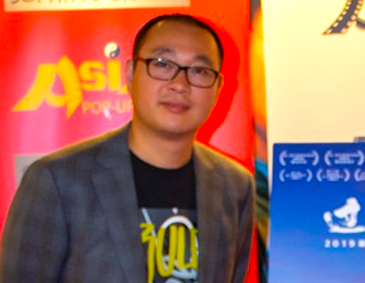CHICAGO – Patrick McDonald of HollywoodChicago.com appears on “The Morning Mess” with Dan Baker on WBGR-FM (Monroe, Wisconsin) on March 21st, 2024, reviewing the new streaming series “Manhunt” – based on the bestseller by James L. Swanson – currently streaming on Apple TV+.
Interview: Huo Meng of ‘Crossing the Border’ at Asian Pop-Up Cinema, Plus Japan Week Preview
CHICAGO – Season Nine of Chicago’s Asian Pop-Up Cinema (APUC) celebrated China on the week of September 15th, and brought in the writer/director Huo Meng to represent his film “Crossing the Border.” The drama of generations blends old and new China through the relationship of a boy and his grandfather.
During summer vacation, Ning Ning, a seven-year-old boy, is sent back to the countryside to be taken care of by his 70-year-old grandfather Li Fu-chang. While the two unfamiliar relatives are getting to know each other, the grandfather gets some news about an old friend, who has suffered a stroke and is dying. He decides to ride a motorbike with his grandson to visit the dying man, who lives thousands of miles away. The film is a meditation on generations and the acceptance and definition of death.

Chinese Film ‘Crossing the Border,’ directed by Huo Meng
Photo credit: AsianPopUpCinema.org
This North American Premiere is part of the program-packed Season Nine of APUC, as their new format (multiple films per week) highlights a different Asian country or theme every week. This week, Japan will be in the spotlight (see page two for a preview). APUC is facilitated by founder and veteran film programmer Sophia Wong Bocchio, and Season Nine features films from South Korea, China, Japan, Thailand, the Phillippines, and Hong Kong, among others. The films mainly screen at Chicago’s AMC River East 21, with various other locations throughout the season (click link below at the end of the article for more details).
Patrick McDonald of HollywoodChicago.com talked to director Huo Meng through an interpreter right before his September 18th screening. “Crossing the Border” is Huo Meng’s directorial debut, and won the Forward Future Award for both film and director at the 2019 Beijing International Film Festival, among other awards.
HollywoodChicago.com: Since this is a film about an old man and a child, what did you learn about being old and being a kid again as you were putting together the film?
Huo Meng: First and foremost, I am very familiar with the village setting of the film, and their lifestyle, in whatever point of life they are in … I have very strong memories and impressions of them. The film is not just about the 90 minutes we see in the story, it’s also the character’s backgrounds and where they come from, reflecting my self expression. My knowledge and experience is in every frame, and the details of the villagers became what I learned. It was an enriching experience.
HollywoodChicago.com: What did you think about death – since it is a theme – that defined and contemplated the final story of film?
Huo Meng: I had been working on the story since 2012, and made the film in 2017. During that period, like everybody, I had some loss in my life. It was reminding me, through my story process, on how to live and how to die. How does death affect the people around that loss? What was happening around me defined how I would approach the concepts in my story. Even as the duo encounter different living people on their road trip, it’s the theme of death that recurs throughout the journey.
HollywoodChicago.com: Since the older character had gone through the revolution in China, what fascinated you about that element of the story and China’s past?
 Director Huo Meng in Chicago Photo credit: AsianPopUpCinema.org |
Huo Meng: The Cultural Revolution is still a sensitive topic in China. It’s not right to erase the memory, because the history did occur, and there are many people who are still alive who experienced it [1965]. Those survivors are still with us, but when they pass away, that point of history will probably fade. The Chinese people have always been very strong when it comes to absorbing the most difficult aspects of life, through their nature of always bouncing back. If something like the Cultural Revolution would occur in the West, it most likely would have a completely different outcome. In the case of the Chinese people, they accepted what happened and went on with their lives.
HollywoodChicago.com: As a director, how did you create the chemistry between the old actor and the child actor to make them seem related?
Huo Meng: In any film, professional or non-professional, one of the most important jobs a director has is casting. It was crucial to find the right actors for this film, because of the intimate nature of it, and that the cameras would be constantly rolling on two actors.
The older man had a theatrical and opera background, so had a naturalism to him that really worked out well. To help him and the child actor with the cameras, I showed them the daily film clips in the beginning. I would actually film them interacting off camera to give them an example of the type of naturalism I wanted, to show them the exact nature of real life I wanted in their performances. The child actor is a hip hop dancer, so was a performer as well. But another lucky element of what I needed was he had to lose one of his baby teeth, and his teeth were loose. [laughs]
HollywoodChicago.com: When you and your friends get together and talk about the U.S., what do you talk about, and what do you think you don’t understand about this country?
Huo Meng: Much of what I know and learn about America comes through the ‘official’ media, and that is sometimes suspect.
HollywoodChicago.com: Same as here. [laughs]
Huo Meng: As a person trying to learn about another space, whether it’s America or anywhere else, I turn to the movies. The deeper you go into a country’s cinema, the more you can find the real issues. It’s a more objective view, when taking in a story through the filmmaker’s eye. It’s not the news that will give you the emotional truth of any country, but the reactions, the people and the feelings I can experience when I watch their movies.
HollywoodChicago.com: What was your goal in providing an objective view in ‘Crossing the Border’?
Huo Meng: I wanted to provide a naturalism and realism to the story, so the audience can learn more about where I came from, and draw their own conclusions from it. The village is where I come from, and now a story about them is being shown half way around the world. And whether there are ten people tonight or a full house, I just appreciate that the film’s journey is now my continuing journey.
On Page Two, Japan Week is highlighted for the Fall Season Nine of the Asian Pop-Up Cinema.


